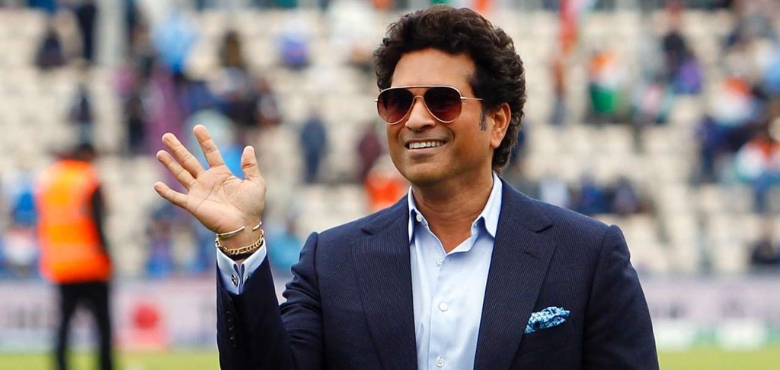Early Life & Background
Sachin Ramesh Tendulkar was born on 24 April 1973 in Mumbai to novelist Ramesh Tendulkar and Rajni Tendulkar, an insurance senior officer. Named after beloved music director Sachin Dev Burman, he was raised in a supportive Rajapur Saraswat Brahmin family. His elder brother Ajit quickly recognized his talent, enrolling him at age 11 to train under coach Ramakant Achrekar. Sachin famously practiced relentlessly at Shivaji Park, blending a fastidious technique with raw flair.
He attended the Sharadashram Vidyamandir in Mumbai, balancing academics with cricket—a discipline that would underpin his legendary career.
Personal Traits & Lifestyle
Tendulkar’s hard-working ethic became legendary. His technique—rooted in textbook precision—was paired with an unwavering mental resilience. Even at a young age, he possessed an obsessive hunger to improve, evident in a strict fitness regimen and diet.
Away from the crease, Sachin has led a humble, grounded lifestyle, staying clear of controversies and remaining deeply approachable. He maintained discipline with early bedtime routines, daily fitness drills, and a diet that emphasized nutrition and recovery.
Personal Life
In 1995, Sachin married his childhood friend Anjali Mehta, and they have two children: Sara (b. 1997) and Arjun (b. 1999). Anjali supported him throughout his career, offering stability amid a grueling international schedule. The Tendulkars maintain a private life, committed to values and family. Post-retirement, Sachin has taken on roles as a philanthropist, mentor, and parliamentarian, giving back through education, health, and sports initiatives.
Youth & Domestic Career
Making waves as a teenager, Sachin debuted for Bombay (now Mumbai) at just 15. His prolific First-Class career spanned from 1988, amassing over 25,396 runs at an extraordinary average of 57.85, including 116 centuries and 81 fifties in 310 matches.
Playing alongside luminaries like Azharuddin and Tendulkar’s early coach Achrekar, he swiftly cemented himself as a domestic force. His Mumbai nights were filled with high-pressure Ranji encounters, where he refined the temperament that later defined his international stardom.
International Career
Debut & Early Rise
On 14 November 1989, at 16, Sachin debuted for India in an ODI versus Pakistan in Karachi—a nerve-wracking start that foreshadowed greatness. Within months, he became a Test regular, famously scoring 119* against England in 1990.
Career Highlights & Stats
Over a monumental career (1989–2013), Tendulkar played 200 Tests, 463 ODIs, and a single T20I. He scored:
-
Tests: 15,921 runs @ 53.78, 51 centuries, 68 fifties
-
ODIs: 18,426 runs @ 44.83, 49 centuries, 96 fifties
-
T20Is: Played 1 match, scored 10 runs
A combined career tally sees him exceed 30,000 international runs, and over 50,000 when domestic is included—a first in cricket.
World Cups & Big-Match Temperament
-
1996 WC: Top-scorer with 523 runs
-
2003 WC: Set a then-record 673 runs
-
2011 WC: Highest Indian run-getter with 482 runs, including crucial innings in knockouts
His ability to shine on the big stage solidified his legacy beyond mere numbers
Combined Career Stats
| Format |
Matches |
Runs |
Avg |
100s |
50s |
| Test |
200 |
15,921 |
53.78 |
51 |
68 |
| ODI |
463 |
18,426 |
44.83 |
49 |
96 |
| T20I |
1 |
10 |
10.00 |
0 |
0 |
IPL Career
Tendulkar signed with Mumbai Indians (MI) in the inaugural IPL of 2008, becoming the team’s cornerstone until his retirement in 2013. Across 78 matches, he scored 2,334 runs at 29.92, averaging a strike rate of 119.8, with a single century and 13 fifties.
Despite intense format pressure, he remained a consistent top-order anchor. Post-retirement, his legacy lives on—MI captain Rohit Sharma often invokes “Sachin’s hunger” to inspire the squad.
Fitness, Injuries & Comebacks
Throughout his 24-year career, Tendulkar faced several injury hurdles:
-
Tennis elbow (mid-2000s): He overcame a prolonged slump to score a 241* in Sydney (2004).
-
Ankle & knee issues: Never sidelined for long, he compensated with strengthening routines.
-
Back spasms & recurring trouble late 2012: He persisted and returned to deliver match-winning performances in 2013.
Comebacks & Later Years
Despite age and injuries, Sachin’s spirit never dimmed. Highlights of his resilient comebacks include:
-
*241 vs Australia, Sydney, 2004:** A masterclass upon return from injury layoff.
-
Two centuries vs South Africa (2010): Post-injury form carried him into his late 30s.
-
Farewell Test, 2013: He concluded with 74 runs at Wankhede amidst records and tears

